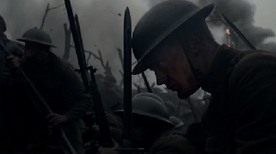
James Darmody in the trenches of the Western Front.
World War I was a major war centred in Europe that began on 28 July 1914 and lasted until 11 November 1918. It involved all the world's great powers, which were assembled in two opposing alliances: the Allies (centred around the Triple Entente of Britain, France and Russia) and the Central Powers (originally centred around the Triple Alliance of Germany, Austria-Hungary and Italy). More than 70 million military personnel, including 60 million Europeans, were mobilised in one of the largest wars in history. More than 9 million combatants were killed, largely because of great technological advances in firepower without corresponding advances in mobility. It was the sixth deadliest conflict in world history, subsequently paving the way for various political changes such as revolutions in the nations involved.
Long-term causes of the war included the imperialistic foreign policies of the great powers of Europe, including the German Empire, the Austro-Hungarian Empire, the Ottoman Empire, the Russian Empire, the British Empire, France, and Italy. The assassination on 28 June 1914 of Archduke Franz Ferdinand of Austria, the heir to the throne of Austria-Hungary, by a Yugoslav nationalist was the proximate trigger of the war. It resulted in a Habsburg ultimatum against the Kingdom of Serbia. Several alliances formed over the previous decades were invoked, so within weeks the major powers were at war; via their colonies, the conflict soon spread around the world.
On 28 July, the conflict opened with the Austro-Hungarian invasion of Serbia, followed by the German invasion of Belgium, Luxembourg and France; and a Russian attack against Germany. After the German march on Paris was brought to a halt, the Western Front settled into a static battle of attrition with a trench line that changed little until 1917. In the East, the Russian army successfully fought against the Austro-Hungarian forces but was forced back by the German army. Additional fronts opened after the Ottoman Empire joined the war in 1914, Italy and Bulgaria in 1915 and Romania in 1916. The Russian Empire collapsed in 1917, and Russia left the war after the October Revolution later that year.
At the outbreak of the war the United States pursued a policy of non-intervention, avoiding conflict while trying to broker a peace. When a German U-boat sank the British liner Lusitania in 1915, with 128 Americans aboard, U.S. President Woodrow Wilson claimed that "America is too proud to fight" but demanded an end to attacks on passenger ships. Germany complied. Wilson unsuccessfully tried to mediate a settlement. However, he also repeatedly warned that the U.S.A. would not tolerate unrestricted submarine warfare, in violation of international law and U.S. ideas of human rights. Wilson was under pressure from former president Theodore Roosevelt, who denounced German acts as "piracy". Wilson's desire to have a seat at negotiations at war's end to advance the League of Nations also played a role in the eventual decision to join the war.[100] Wilson's Secretary of State, William Jennings Bryan, whose opinions had been ignored, resigned in 1915, as he could no longer support the president's policy. Public opinion was angered at suspected German sabotage of Black Tom in Jersey City, New Jersey, and the Kingsland Explosion.
In January 1917, as Germany's situation deteriorated due to the British blockade, unrestricted submarine warfare was resumed to attempt to break the stalemate. The German Foreign Minister, in the Zimmermann Telegram, told Mexico that U.S. entry was likely once unrestricted submarine warfare began, and invited Mexico to join the war as Germany's ally against the United States. In return, the Germans would send Mexico money and help it recover the territories of Texas, New Mexico, and Arizona that Mexico had lost during the Mexican-American War 70 years earlier. Wilson released the Zimmerman note to the public. After the sinking of seven U.S. merchant ships by submarines and the publication of the Zimmerman telegram, Wilson called for war on Germany, which the U.S. Congress declared on 6 April 1917.
The United States was never formally a member of the Allies but became a self-styled "Associated Power". The United States had a small army, but, after the passage of the Selective Service Act, it drafted 2.8 million men, and by summer 1918 was sending 10,000 fresh soldiers to France every day. In 1917, the U.S. Congress gave U.S. citizenship to Puerto Ricans when they were drafted to participate in World War I, as part of the Jones Act. Germany had miscalculated, believing it would be many more months before American soldiers would arrive and that their arrival could be stopped by U-boats. Jimmy Darmody and Richard Harrow both fought in France during the war. Al Capone claims to have fought with the Lost Battalion but did not actually join the military at all.
After a 1918 German offensive along the western front, United States forces entered the trenches and the Allies drove back the German armies in a series of successful offensives. Germany, which had its own trouble with revolutionaries at this point, agreed to a cease-fire on 11 November 1918, later known as Armistice Day. The war had ended in victory of the Allies.
External links[]
| This page uses Creative Commons Licensed content from Wikipedia (view authors). |
